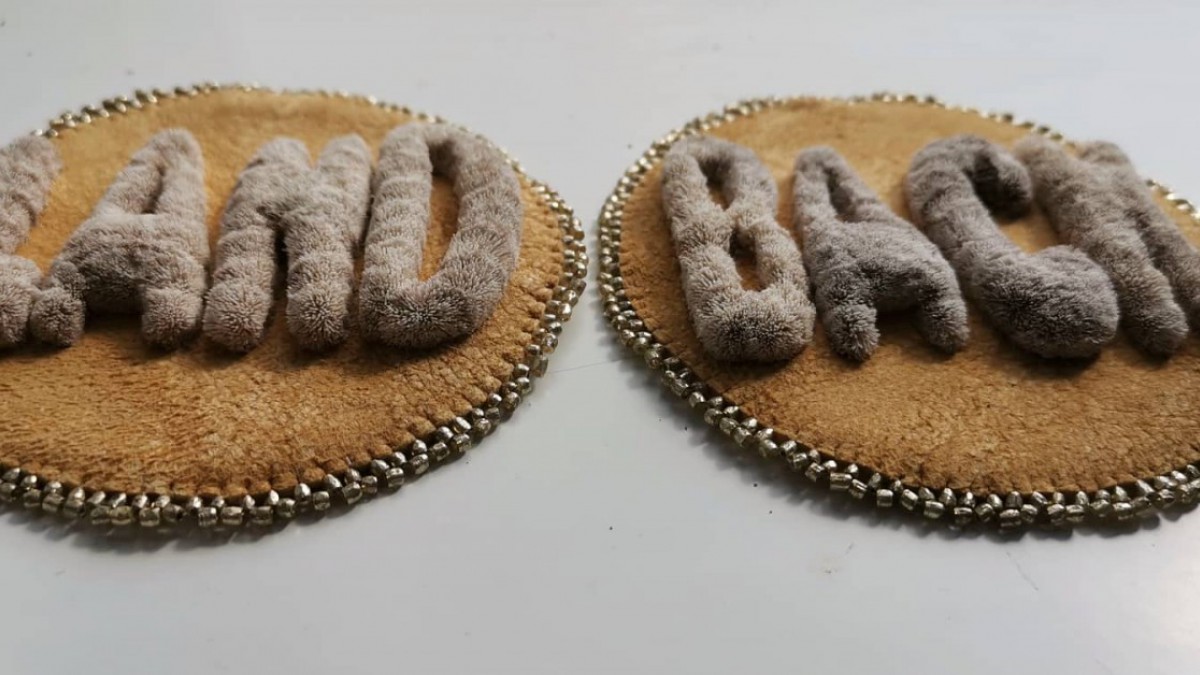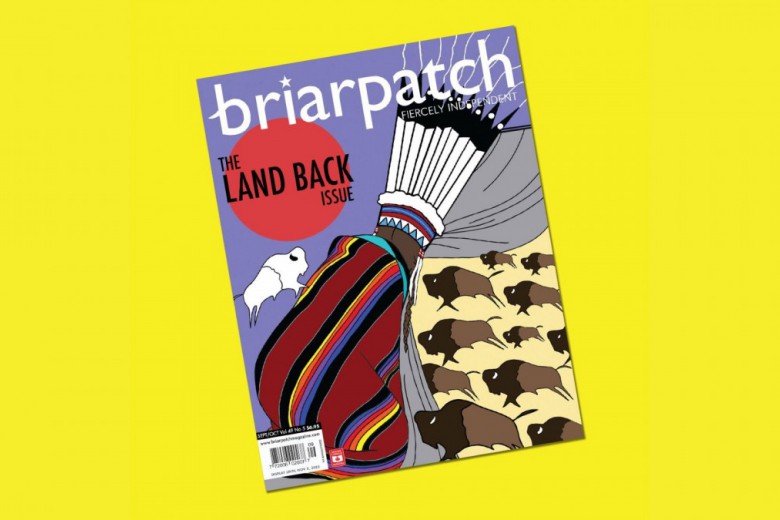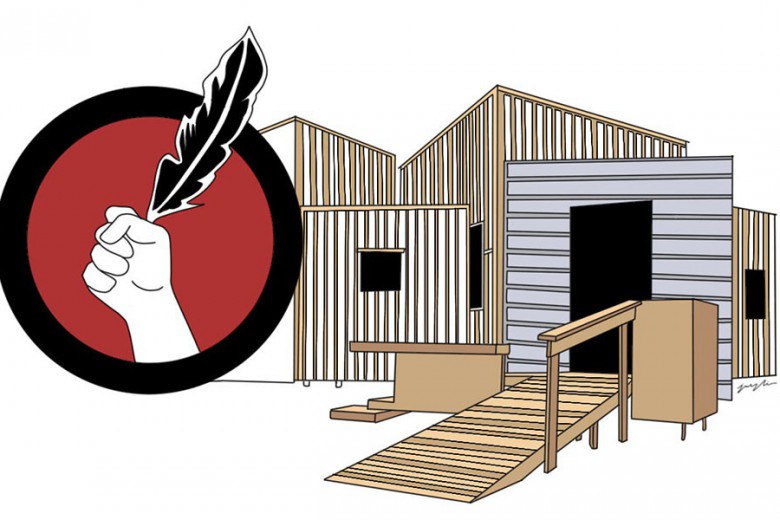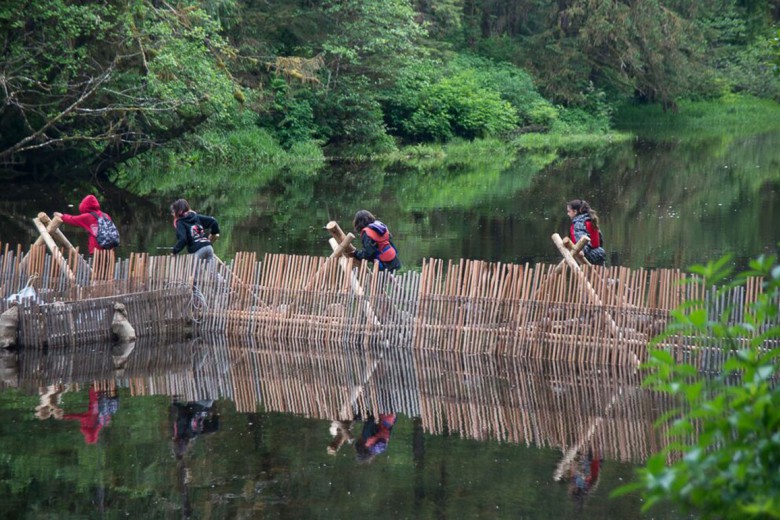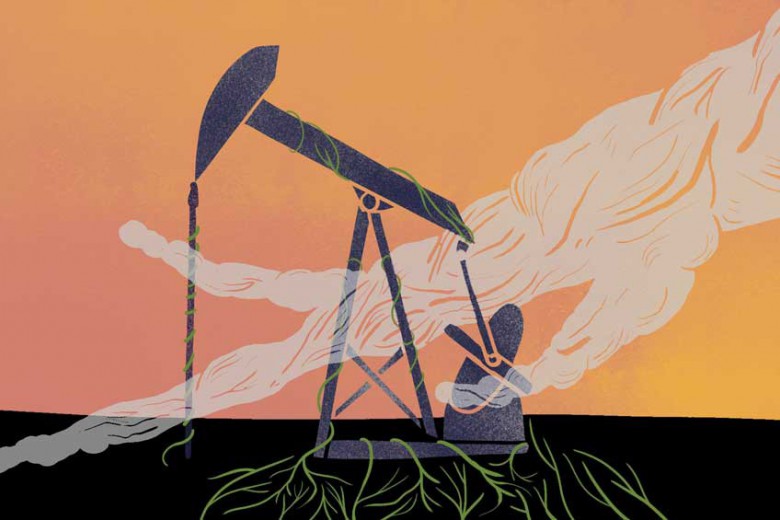Hunting is often thought of as a masculine activity. To make the link between hunting, land use, and Land Back, Alex Wilson spoke to three Indigenous women hunters about patriarchy, spirituality, and the joys of being on the land.
AJ My name is Angela James. My last name comes from my husband’s family from the Xwisten Nation in B.C. I’m from the Beaver and Bigstone families in Treaty 8 territory within the Bigstone Cree Nation. I live on reserve. I was born and raised in Sandy Lake. I work here, I live here, I raise my family here right on the land my grandparents lived on.
TM My name is Tanya McCallum, I am a Woodland Cree from northern Saskatchewan, Pelican Narrows. I currently live in an urban setting, Prince Albert, which is four hours south of where I come from. I was raised by my grandparents, and I have two daughters. The first form of my education was living off the land. I continue to live off the land.
MC Tansi, my name is Michela Carrière. I’m from the Saskatchewan River delta near Cumberland House. I grew up on the trapline about 50 kilometres from Cumberland House and that’s where I am now. We’re surrounded by the woods and this is where my parents raised me, hunting, fishing, trapping. My grandfather has been here since the 1930s and then before that the Cree people were always here along this river. Now my business is canoe guiding. I teach people about canoeing and harvesting medicines and my connection to the land.
"My grandfather has been here since the 1930s and then before that the Cree people were always here along this river."
AW What kind of hunting do you do?
TM I hunt for sustenance, to feed my family. I don’t do any sport hunting whatsoever. That’s just the way I was raised – we didn’t hunt for the biggest antlers or anything like that. The cost of food where I live gets expensive, so, for example, we harvest the moose in the fall.
AJ As a kid I used to think that ketamahkseyah (we were poor) because we grew up with fish and moose and duck and rabbit and wild, organic food. And the other kids down the street, they would have mac and cheese and the newest thing that you saw on that one channel you got on TV back then. But we grew up on sustenance, too, and our teeth were perfect, we had no teeth problems. Kids have too much sugar in their diet today, whereas our food doesn’t when it’s off the land.
MC The hunting I do is for sustenance, what we can eat. I’ve gone out moose and deer hunting with my dad. We do a lot of bird hunting, ducks and geese and grouse, which is my favourite kind of hunting. We do some fishing but mainly with fishing nets. Just yesterday we had a fresh meal all from the land – vegetables from my garden and fish. It was so delicious.
In the winter, we’ve done a lot of trapping. It’s changed over the years, though. The hydro dam really affected the environment. We don’t hunt as much. It’s been around 10 years since we harvested the moose, because the floods have done so much damage. We don’t trap as much for a living as we used to, but we still do trap and we use every part of the animal. We use the furs for making clothing; either I harvest the meat for myself or for our sled dogs; and I use the bones for artwork.
"The hydro dam really affected the environment. We don’t hunt as much. It’s been around 10 years since we harvested the moose, because the floods have done so much damage."
AW Hunting is sometimes thought of as a masculine activity or even as a “sport.” What are some experiences or observations that you have, specific to being a woman who hunts, traps, or fishes?
AJ My dad would take us out on the land when we were small, but that changed when we hit puberty – when we were around 10 or 11 – and we just weren’t allowed to go anymore. I used to wonder about that, and I hated it. I really so badly wanted to be a boy because boys were allowed to do so many cool things compared to girls, I thought. And that’s why I am the way that I am: I have a bow, guns, and I have knives too. I just love to do things like that because when I was younger I was limited and not allowed.
AW When did you start hunting again after you were prohibited as a girl?
AJ I always did. I’d sneak off and follow my brothers, who were 10 or 11 years old, going off by themselves for the whole day. I’d go walk with them and hunt with them. I’d always help with cutting the moose meat, the fish, and the rabbits. I kind of always did hunt, you know – on the sly, on the keemooch (in secret).
When I got older, no one could tell me what to do. My husband, he bought me a gun for Valentine’s Day or something – it was a semi-automatic .22 – and my dad was a little worried. But I was so happy! I said, “This is way the heck better than flowers! Flowers die. This, I can use.” [laughs]
"I kind of always did hunt, you know – on the sly, on the keemooch."
TM I can totally relate to Angela. I grew up with my grandparents out on the trapline. There were hunters, fishers, gatherers, trappers – but I saw that no females hunted in my family. My uncles and my grandfather did all the hunting, while my grandmother stayed home and took care of whatever my grandfather brought home. That’s all I knew.
When I visited my grandmother, she would be hungry for wild meat. I thought to myself, “I better start hunting, because someone’s got to provide for my grandmother.”
Because my grandparents were very heavily influenced by the churches, patriarchy played a big role in my family. My grandmother was a woman of few words; the residential school system took a toll on her. She was there from the age of five – so what she knew was what she learned from the church.
Even though the females did not hunt, I would follow my brother like you did, Angela. By the time my grandfather passed away, I had graduated high school and moved away. When I visited my grandmother, she would be hungry for wild meat. I thought to myself, “I better start hunting, because someone’s got to provide for my grandmother.” That’s when I took up hunting, about 25 years ago.
I started watching hunting films because I didn’t really know how to hunt. My partner at the time was a big-time hunter but he couldn’t teach me hunting because he is Métis and he couldn’t hunt with a Treaty person. We hunted together but he couldn’t shoot – so I became the shooter.
I passed on those traditional teachings to my daughter, who’s now 22, and she’s been hunting since a young age. In the past three years, she started killing deer and moose. I go out on my own a lot, and being out on that land just soothes the soul. I gather my thoughts. Sometimes I actually kind of cross my fingers hoping I don’t see a moose, because if I do, that’s hours of work for me [laughs]. Being out on the land is just kind of my thing.
"I go out on my own a lot, and being out on that land just soothes the soul. I gather my thoughts."
MC I was never really raised with my parents being strict about “this is how women should act, this is how men should act,” mainly because my mom was kind of a renegade that way.
Even so, my sister and I were encouraged to stay close to home. My grandmother said the wolves could smell you – she had all these stories about how it was a little more dangerous to be a woman in the woods. There were smaller rules I remember, like if you’re a woman you weren’t allowed to step over top of the fishnet or step on top of the beaver house because there was some sort of energy that could … I don’t know, it wasn’t ever really explained.
My brother went to school in town when he was 14, so it was just me and my sister and my dad. There were no other men around, so my dad taught us everything he knows about trapping and hunting. He didn’t have any issues with that, he never made us feel like we were different in that way
AW How do you see women and hunting being a part of the Land Back movement?
TM I was watching a video of my great-grandmother, who was interviewed in 1992, and the interview had to do with women’s roles and child-rearing. At the time, my great-grandmother was in her mid-80s, so when she’s talking about the past, she’s talking about way back. She talked about how hunting used to be a partnership between the male and the female: they both went out, they both hunted, they did whatever they could to survive. When the churches came – with patriarchy and colonialism – that’s when she started to see the shift. They were nomadic people, so she talked about how when she was little they would move around and people followed the animals. But over time they got restricted to traplines, and they were told, “This is your block, this is your trapline, you can only hunt in this area.” In her age she saw this shift where hunting became this male-dominated sport. That shift was something she observed in her daughter (my grandmother). I am glad my mother has me as a role model, as a woman who hunts, because I had to search YouTube to find that history myself. And I don’t want my daughters going through that.
I don’t sit around all day talking to my kids about hunting – they just learn by being on the land with me, by observing. They pick up those things from me – their mother hunts so they can do it too, and they pass it on. When we talk about Land Back, when I refer back to what my great-grandmother had to say, I’m going back to those traditional ways, going back to how it was.
"She talked about how hunting used to be a partnership between the male and the female: they both went out, they both hunted, they did whatever they could to survive. When the churches came – with patriarchy and colonialism – that’s when she started to see the shift."
MC When I go out hunting or fishing or trapping it’s a really intimate relationship with the land. So I think that’s how it brings the land back to me. The land becomes a part of my heart and soul and I really want to do more to advocate for the environment around here. It helps me learn the language, because when my dad, who speaks Cree, is out in the woods, he can describe and tell stories. Sometimes when we’re out there he’ll only speak Cree and those stories come back to him. And then I’ll learn more about the trails and the areas where my grandfather and great-grandfather used to hunt and trap, and it kinda helps me teach the next generation – my nephews and my niece. Or whenever I bring people paddling through here, I actually have stories to tell them. I can tell them, “This is my intimate connection with the land, you can’t take this from me, ever, because it’s a part of my DNA.” I learn about the values of the land, because when you’re out on the land you learn how to work together as a group, you learn how to listen, you learn about patience.
AJ When you reconnect with the land, and our survival from it, it really makes you realize how small we are as human beings. We are not as big as we think we are. And when you reconnect with the land, you also reconnect with our spirits, and we are empowered, and it helps the Land Back movement.
A few years ago I was on my way to a ceremony in another community, and I took my rifle with me, ’cause I had a feeling. On the way I saw a moose, so I pulled over. I’m standing there looking at this moose – it was quite a distance away, and I got my rifle, no scope. I thought, “There’s a reason why this animal is here.” I was always taught that when you need that sustenance, send your prayers out, and that animal gives up its life for you, for your family to live off of. You share with everyone, you give your best parts to the Elders, you only take what you need for that time of the year.
After I realized the moose was down, I called my dad and asked him to help. Because I never had that teaching – like, yeah, you shot the moose, but then now what the heck do you do, right? I knew the end part – how to cut the meat, how to dry meat – but I didn’t know the in-between. My dad and brothers come, and the first thing he asks me was “stemow kihahow? (did you put tobacco down?)” That’s protocol. And that’s exactly the first thing I did because it’s intuition – it’s in our DNA – because tobacco is such a sacred medicine.
Then my dad asks, “Where’d you shoot this moose from?” and I point, and he’s like “Really? That’s like 200 yards,” and he was just shocked because I had no scope. After that, my husband asked me to marry him, I responded with “Why are you asking me now? Because I’m a good provider?” And he’s like “Yep.” [laughs]
"And that’s exactly the first thing I did because it’s intuition – it’s in our DNA – because tobacco is such a sacred medicine."
TM I really enjoyed what you said, Angela. Back in March, just before COVID lockdowns started, I had a dream: my grandfather came into my dream, and all of a sudden there was this herd of 18 to 20 moose. I remember looking at them like, “Wow, I’ve never seen that many moose in my life.” So I got up early the next day, thinking to myself, “I’m gonna go for a hunting ride.” It was unusual for me because I always hunt the way my grandparents used to hunt: in the fall and into winter is the season. I do not hunt in the summertime or spring, even though I’m a Treaty person and can hunt year-round, because the moose are pregnant.
So the next day, I left at five in the morning, and this time I’m going south for about three hours, by Hudson’s Bay. Shortly after 8 a.m., when we got to the provincial forest, what’s there? Three moose. I couldn’t believe it. There was a cow, a young moose, and a bull. The dream I had about my grandfather, about the moose. I ended up shooting the bull, and gave half to my grandmother and half to my grandfather. It was COVID times, these people need meat. It was very good. There’s times like this, like Angela said, where you just know you’re gonna see something. It was a very powerful dream.
AW Is there anything you’d like Canadian settlers to know about hunting, Indigenous hunting rights, and women in hunting?
TM There’s a lot of anger toward Indigenous people because treaty people have the right to hunt year-round and settlers don’t. What I would like to tell them is that there’s more to hunting than just coming home with the game. They need to know that hunting is almost a ceremony, because that animal is a sentient being. They’re giving themselves to you to use for sustenance. And we do protocols, we give tobacco, we say a prayer, we have some kind of offering. And we use every part of whatever we kill – nothing goes to waste. Say, for example, when I see a report of a moose that was shot and only the hind quarters were taken, my first thought is, “That can’t be an Indigenous person, because we take everything. We can’t let any part of it go to waste.”
"They need to know that hunting is almost a ceremony, because that animal is a sentient being. They’re giving themselves to you to use for sustenance."
AJ To be honest with you I don’t really know what my hunting rights are. I saw three moose not too far from here in a farmer’s field, and my sister was yelling at me, “You have your gun! Why don’t you just shoot?” I thought about many things at that moment, like how our treaty and hunting rights are limited but the moose is still free, for now – not like how we live.
On the Métis settlement I used to work at, a hunter was telling me she went hunting with her husband and she shot this moose and this farmer came and gave them shit. And she said, “Well, I shot it, and it jumped over your fence and died here, so it’s okay.” It made me wonder, whose land was that before that fence was up? Why can’t we hunt to feed our families when some people own so much land?
But what I want them to know – not just settlers, but a lot of our own people, who are very lost when it comes to protocol and realizing that we are all connected – is that the moose, the bear, the elk, the muskrat, the fish, all these animals, these beings, they’re our relatives. You’ve got to honour that protocol, honour that connection, that we are part of something bigger than all of us, we aren’t almighty human beings at the top of the food chain, ’cause we’re not. You take away our guns, you take away our bows, you take away that technology and go out on the land, see how big we are. We’re not.
MC There’s the Treaty Rights, there’s the Canadian law, but there’s also the rights within our own culture, and that’s what we pass down – like how to respect those animals and when to hunt. Those are really important. I wish that the greater public knew about those as well.
For me, as a Métis person, I don’t have the rights to go and hunt anywhere at any time of the year. But specifically here at Big Eddy Lodge (named after the big eddy in the river where the water slows down and fish gather), on the trapline, I have rights to hunt for sustenance. But I still have to pay taxes and a lease for that right to hunt, trap, and guide. I would love to be a female hunting guide and take women and kids to teach them how to hunt, but I have to pay for the right to do that. I think there’s a misconception that as Indigenous people we’re living lawless, or not paying for our rights. But it’s different across the board, there are all sorts of rules affecting us.
"I think there’s a misconception that as Indigenous people we’re living lawless, or not paying for our rights."
AW What words do you have for the next generation?
TM There were times I got discouraged for being a female hunter, especially with my male peers. When the topic of hunting comes up, and I hop in there and start talking about it, it’s like they’re not even hearing me. It’s like they’re jealous, like I shouldn’t even be talking about it, it’s a male thing. “Don’t be discouraged” is what I gotta say. Just do it. Do it for enjoyment, for sustenance.
AJ Don’t be ashamed of what the land has to offer to your family and your body. It’s not a brutal thing, hunting. We do it for survival, only when we need to. Our relatives are not trophies to be hung on walls. Let them go, let their spirits go, let them make that journey. I hope that you reconnect with your own spirit, out on the land, so that you find your way back, and not get so lost in the busyness of the world.
"Our relatives are not trophies to be hung on walls. Let them go, let their spirits go, let them make that journey."
MC Be curious and start doing some research by asking questions. If you know anybody who hunts, don’t ask them how they hunt, just ask them what their best hunting stories are. Any hunter loves to tell stories – especially in our area, Cree hunters love to tell stories. If it’s a humorous story, then you learn about the mistakes that they made. Or if it’s a beautiful story, you learn about the protocol and the respect that they give the animals.
APTN has a lot of really cool hunting and cooking shows around harvesting animals. Definitely watch Merchants of the Wild, that’s a really good show that I was involved with about some young Indigenous people getting back to the land and how difficult it can be but how rewarding it also is. And then my advice is to just get out there and do it.
The stories I have from my dad about how he started hunting – he would borrow his dad’s gun and go out on his own, and start shooting birds in the backyard, and he was only five years old at the time. Now, I wouldn’t recommend doing that exactly, but he would just go out on his own and practise gearing up: putting on the right outfit, going out, realizing there are too many bugs, going back and putting on a bug suit, then realizing it’s too hot and going back. Know how to be comfortable. You don’t have to go out there and harvest an animal right now. Someone told me, “We call it hunting, we don’t call it killing.” It’s a blessing to even see an animal. Most times you won’t see or harvest anything. But it’s a beautiful process, going out there for that feeling of calm and peace. It’s not always about getting an animal to provide for your family, it’s about going out and getting active. Becoming intimate with the land.


